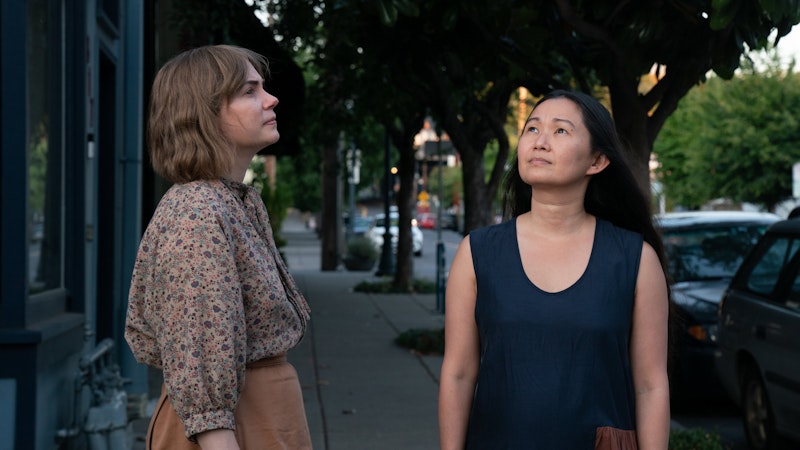Kelly Reichardt’s known for making small independent films in which unimportant people don’t do much, and take a long time doing it. A skeptical viewer might call her movies cinema program fiction—the Iowa Writer’s Workshop, but with a projector. Showing Up is a typical example of her style (sometimes to the point of parody) and a low-key justification of it.
The movie’s set amongst a bunch of more-or-less struggling artists in Portland, Oregon. Lizzy (a stunningly dumpy Michelle Williams) is preparing for an upcoming solo exhibit which will feature her colorful, detailed clay figures of women in everyday poses. Shaping these figures is slow going, especially since she keeps getting interrupted by mundane irritations. Her friend and landlord Jo (Hong Chau) has two of her own exhibits, and won’t fix Lizzy’s broken hot water heater. And Lizzy’s brother Sean (John Magaro) may or may not be having an (again very low-key) mental breakdown.
The execution has even less drama than that non-plot suggests. There’s little in the way of open conflict or open resolution. Instead, Lizzy shuffles neurotically from unsatisfying encounter to unsatisfying encounter. She’s jealous of Jo—who has two openings to Lizzy’s one. She’s also jealous of her brother. Her mother Jean (Maryann Plunkett) considers Sean the genius in the family—a judgment that’s doubly painful since Jean is also Lizzy’s boss at the small art museum where she works.
Lizzy bristles whenever people praise her work, and she bristles when they don’t. She has no patience and little charm. When Eric, the kiln supervisor (André Benjamin, aka André 3000) tells her imperfections in the firing can make a piece better, she looks like she’s going to throw up. When her cat Ricky mauls a pigeon that got into her house, she shoves it out the window. “Go die somewhere else!” she urges it.
Jo finds the pigeon, though, and after bandaging it up, she dumps it on Lizzy to watch and care for. Lizzy turns out to be good at caring for wounded birds, and maybe enjoys it too, though she doesn’t admit it. Similarly, she’s the one who keeps checking up on Sean while Jean and her boorish divorced dad Bill (Judd Hirsch) are doing their best to ignore him. The obsessive attention to detail in her artwork translates into an obsessive sense of conscientiousness. She’s not necessarily good company or generous. But she shows up. And in return, her dysfunctional family, her self-absorbed landlord, and the rest of her community attend her show to praise her work and argue over who gets to eat the cheese.
Lizzy’s art is one of attention; her work is painstaking and significantly less eye-catching than Jo’s large scale colorful fiber sculptures. The parallel with Reichardt is obvious, and only made more so when the camera lingers on Lizzy’s monotonous sculpture of a woman transformed, at glacial speed, into a monotonous film about a woman.
“Monotonous” can mean different things to different people. Lizzy doesn’t look happy or bored when she works on her clay. She’s focused in the moment—which is a kind of showing up. The sculptor’s care for her art is her care for her pigeon and brother, which means that Reichardt’s care for her art is also an act of love—for her own work, her characters, her performers, including Williams, who has become her most consistent and persistent muse.
Showing Up asks its audience to pay attention, even though not a lot’s happening in the film. Not a whole lot happens in most people’s lives day to day either. But being present for beauty and for those you care about is still a virtue and, Reichardt suggests, a discipline. The film’s tics, and its remorseless inconsequence, can grate. But there’s also a grace in its insistence that meaning doesn’t need to mean much to matter.

